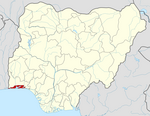Amuwo-Odofin
Amuwo-Odofin | |
|---|---|
 Location within Lagos Metropolitan Area | |
| Coordinates: 6°27′N 3°16′E / 6.450°N 3.267°E | |
| Country | |
| State | Lagos State |
| Government | |
| • Local Government Chairwoman and the Head of the Local Government Council | Modupe Ojodu |
| Time zone | UTC+1 (WAT) |
| Website | www |
Amuwo-Odofin is a local government area (LGA) in the Badagry Division, Lagos State, Nigeria.
Amuwo Odofin LGA is divided into Oriade and Amuwo Local Council Development Area (LCDA) with 7 wards each; Abule-osun, Agboju, Ibeshe, Ijegun, Irede, Kirikir and Kuje wards constitute Oriade LCDA and Ado-soba, Ekoakete, Ifelodun, Ilado Tamaro, Irepodun, Odofin and Orire wards comprising Amuwo LCDA.
Spread among the 14 wards are 67 communities, 12 of which are Urban, 8 semi-urban and 47 rural. Amuwo Odofin LGA has a population density of approximately 300,000 people per square kilometer.[1]
The LGA, with a population of over 1,500,000 according to the 2006 Census shares its boundaries with Ajeromi and Ifelodun LCDA in the East, Oriade LCDA in the West, the Badagry Creek to the South and Isolo/Igando LCDA to the North.
The indigenous dwellers of Amuwo Odofin are mainly the Aworis. Some of the festivals embraced by the people are Elegba, Oro, Sangbeto and Igunuko festivals. The custodians of culture and tradition in the area are the traditional rulers. The Local Government is blessed with highly reputable Obas and Chiefs and Baales. This includes Oba Mobadenle Obalade Oyekan- the Onilado of Ilado/Inagbe Islands and Oba Lateef Olayinka Ado, Fabuwa 1, Alado of Ado Land.
Nonetheless, considering its location as a near border Local Government, International trade has found its root in the area with people of various extractions engaging in various forms of trading activities. It must also be stated that the hospitality of the people has also attracted people from other ethnic tribes in Nigeria as well as from neighbouring West African States to the area.[2]
References
- ^ Ministry of Economic Planning and Budget (2011). LAGOS BUREAU OF STATISTICS. Lagos: Secretariat, Alausa. p. 3.
- ^ AMUWO ODOFIN LGA. "Profile". Amuwo Odofin Local Government. Archived from the original on 25 March 2017. Retrieved 25 March 2017.

